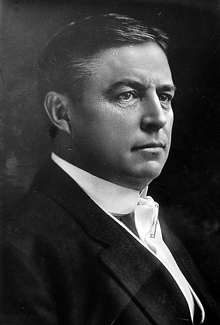Augustus E. Thomas
| Augustus Thomas | |
|---|---|
 |
|
| Born | January 8, 1857 St. Louis, Missouri, US |
| Died | August 12, 1934 (aged 77) Nyack, New York, US |
| Other names | Augustus Thomas August Thomas 'Gus' Thomas |
| Occupation | Playwright |
| Years active | 1889–1926 |
Augustus Thomas (January 8, 1857 – August 12, 1934) was an American playwright.
Born in St. Louis, Missouri and son of a doctor, Thomas worked a number of jobs including as a page in the 41st Congress, studying law, and gaining some practical railway work experience before he turned to journalism and became editor of the Kansas City Mirror in 1889. Thomas had been writing since his teens when he wrote plays and even organized a small theatrical touring company.
Thomas was hired to work as an assistant at Pope's Theatre in St. Louis. During this time, he wrote a one-act play called Editha's Burglar, based on a short story by Frances Hodgson Burnett called The Burglar. After touring in the play, he expanded the show to four acts, renamed it The Burglar, and was able to get Maurice Barrymore to play the title role. Subsequently, he was hired to succeed Dion Boucicault adapting foreign plays for the Madison Square Theatre.
His first successful play, Alabama, was produced by Kirke La Shelle in 1891 and its financial reward allowed Thomas to write full-time. Alabama is the story of an un-reconstructed Confederate. Notably, Thomas was one of the first playwrights to make use of American material. Other plays along the same lines include Arizona (1900), In Mizzoura (1893), Colorado (1900) and Rio Grande (1916). Perhaps his most successful play was The Copperhead (1918) which made Lionel Barrymore a star.
Thomas reached a high artistic level in Arizona and The Witching Hour. A novelization of the latter appeared in 1908. He was elected to membership in the American Academy of Arts and Letters, was awarded the National Institute's gold medal in 1913, and in 1914 received an honorary A. M. degree from Williams College. According to the Oxford Companion to the Theatre, his plays are "on the whole, not profound, and provided entertainment of a kind acceptable to his audiences." Thomas was elected to The Lambs theatrical club in 1889 and served as its president from 1907 to 1910. He died in 1934 and was buried in Bellefontaine Cemetery in St. Louis.
...
Wikipedia
